Fengyi Wu
ExpAlign: Expectation-Guided Vision-Language Alignment for Open-Vocabulary Grounding
Jan 30, 2026Abstract:Open-vocabulary grounding requires accurate vision-language alignment under weak supervision, yet existing methods either rely on global sentence embeddings that lack fine-grained expressiveness or introduce token-level alignment with explicit supervision or heavy cross-attention designs. We propose ExpAlign, a theoretically grounded vision-language alignment framework built on a principled multiple instance learning formulation. ExpAlign introduces an Expectation Alignment Head that performs attention-based soft MIL pooling over token-region similarities, enabling implicit token and instance selection without additional annotations. To further stabilize alignment learning, we develop an energy-based multi-scale consistency regularization scheme, including a Top-K multi-positive contrastive objective and a Geometry-Aware Consistency Objective derived from a Lagrangian-constrained free-energy minimization. Extensive experiments show that ExpAlign consistently improves open-vocabulary detection and zero-shot instance segmentation, particularly on long-tail categories. Most notably, it achieves 36.2 AP$_r$ on the LVIS minival split, outperforming other state-of-the-art methods at comparable model scale, while remaining lightweight and inference-efficient.
Emotion-LLaMAv2 and MMEVerse: A New Framework and Benchmark for Multimodal Emotion Understanding
Jan 23, 2026Abstract:Understanding human emotions from multimodal signals poses a significant challenge in affective computing and human-robot interaction. While multimodal large language models (MLLMs) have excelled in general vision-language tasks, their capabilities in emotional reasoning remain limited. The field currently suffers from a scarcity of large-scale datasets with high-quality, descriptive emotion annotations and lacks standardized benchmarks for evaluation. Our preliminary framework, Emotion-LLaMA, pioneered instruction-tuned multimodal learning for emotion reasoning but was restricted by explicit face detectors, implicit fusion strategies, and low-quality training data with limited scale. To address these limitations, we present Emotion-LLaMAv2 and the MMEVerse benchmark, establishing an end-to-end pipeline together with a standardized evaluation setting for emotion recognition and reasoning. Emotion-LLaMAv2 introduces three key advances. First, an end-to-end multiview encoder eliminates external face detection and captures nuanced emotional cues via richer spatial and temporal multiview tokens. Second, a Conv Attention pre-fusion module is designed to enable simultaneous local and global multimodal feature interactions external to the LLM backbone. Third, a perception-to-cognition curriculum instruction tuning scheme within the LLaMA2 backbone unifies emotion recognition and free-form emotion reasoning. To support large-scale training and reproducible evaluation, MMEVerse aggregates twelve publicly available emotion datasets, including IEMOCAP, MELD, DFEW, and MAFW, into a unified multimodal instruction format. The data are re-annotated via a multi-agent pipeline involving Qwen2 Audio, Qwen2.5 VL, and GPT 4o, producing 130k training clips and 36k testing clips across 18 evaluation benchmarks.
Overcoming Joint Intractability with Lossless Hierarchical Speculative Decoding
Jan 09, 2026Abstract:Verification is a key bottleneck in improving inference speed while maintaining distribution fidelity in Speculative Decoding. Recent work has shown that sequence-level verification leads to a higher number of accepted tokens compared to token-wise verification. However, existing solutions often rely on surrogate approximations or are constrained by partial information, struggling with joint intractability. In this work, we propose Hierarchical Speculative Decoding (HSD), a provably lossless verification method that significantly boosts the expected number of accepted tokens and overcomes joint intractability by balancing excess and deficient probability mass across accessible branches. Our extensive large-scale experiments demonstrate that HSD yields consistent improvements in acceptance rates across diverse model families and benchmarks. Moreover, its strong explainability and generality make it readily integrable into a wide range of speculative decoding frameworks. Notably, integrating HSD into EAGLE-3 yields over a 12% performance gain, establishing state-of-the-art decoding efficiency without compromising distribution fidelity. Code is available at https://github.com/ZhouYuxuanYX/Hierarchical-Speculative-Decoding.
RPCANet++: Deep Interpretable Robust PCA for Sparse Object Segmentation
Aug 06, 2025
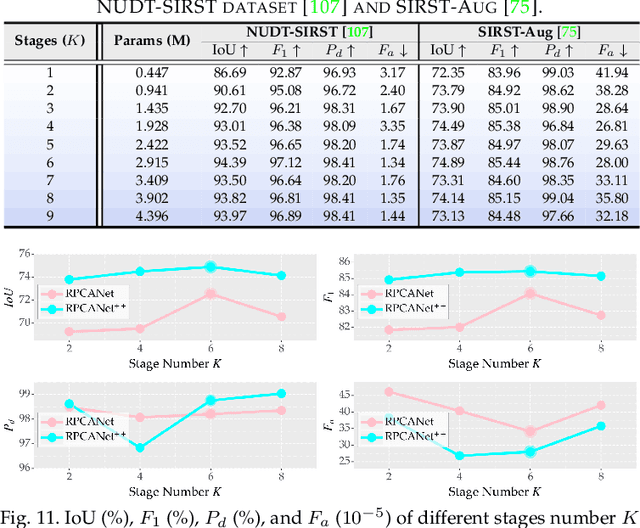

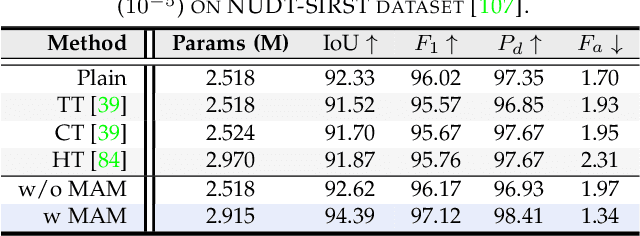
Abstract:Robust principal component analysis (RPCA) decomposes an observation matrix into low-rank background and sparse object components. This capability has enabled its application in tasks ranging from image restoration to segmentation. However, traditional RPCA models suffer from computational burdens caused by matrix operations, reliance on finely tuned hyperparameters, and rigid priors that limit adaptability in dynamic scenarios. To solve these limitations, we propose RPCANet++, a sparse object segmentation framework that fuses the interpretability of RPCA with efficient deep architectures. Our approach unfolds a relaxed RPCA model into a structured network comprising a Background Approximation Module (BAM), an Object Extraction Module (OEM), and an Image Restoration Module (IRM). To mitigate inter-stage transmission loss in the BAM, we introduce a Memory-Augmented Module (MAM) to enhance background feature preservation, while a Deep Contrast Prior Module (DCPM) leverages saliency cues to expedite object extraction. Extensive experiments on diverse datasets demonstrate that RPCANet++ achieves state-of-the-art performance under various imaging scenarios. We further improve interpretability via visual and numerical low-rankness and sparsity measurements. By combining the theoretical strengths of RPCA with the efficiency of deep networks, our approach sets a new baseline for reliable and interpretable sparse object segmentation. Codes are available at our Project Webpage https://fengyiwu98.github.io/rpcanetx.
Pyramid Sparse Transformer: Enhancing Multi-Scale Feature Fusion with Dynamic Token Selection
May 19, 2025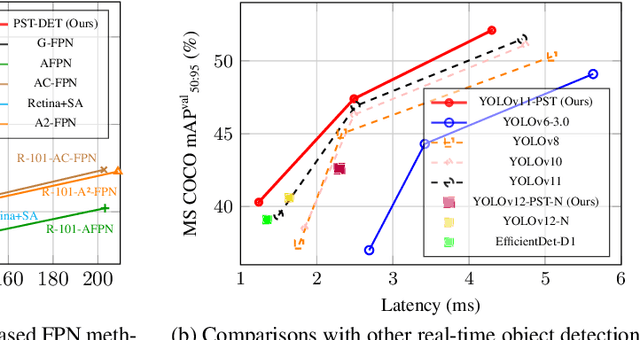
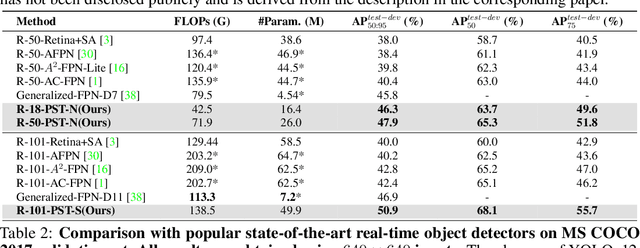
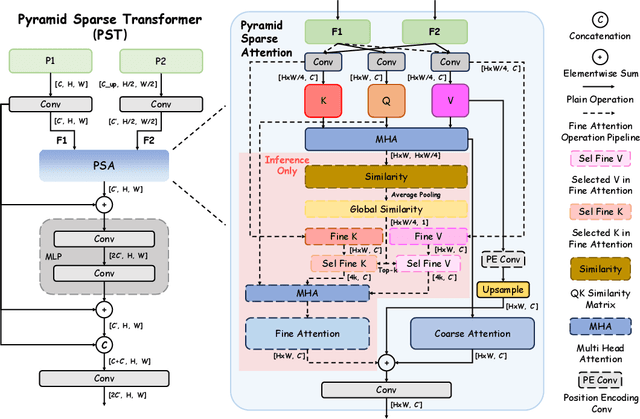
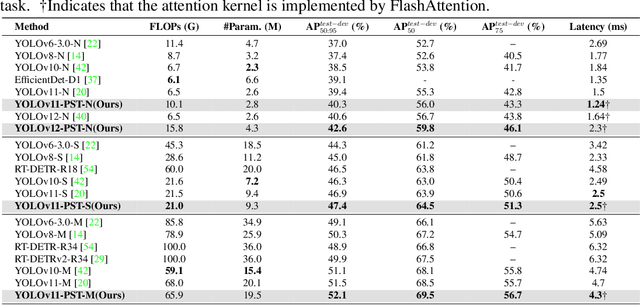
Abstract:Feature fusion is critical for high-performance vision models but often incurs prohibitive complexity. However, prevailing attention-based fusion methods often involve significant computational complexity and implementation challenges, limiting their efficiency in resource-constrained environments. To address these issues, we introduce the Pyramid Sparse Transformer (PST), a lightweight, plug-and-play module that integrates coarse-to-fine token selection and shared attention parameters to reduce computation while preserving spatial detail. PST can be trained using only coarse attention and seamlessly activated at inference for further accuracy gains without retraining. When added to state-of-the-art real-time detection models, such as YOLOv11-N/S/M, PST yields mAP improvements of 0.9%, 0.5%, and 0.4% on MS COCO with minimal latency impact. Likewise, embedding PST into ResNet-18/50/101 as backbones, boosts ImageNet top-1 accuracy by 6.5%, 1.7%, and 1.0%, respectively. These results demonstrate PST's effectiveness as a simple, hardware-friendly enhancement for both detection and classification tasks.
Securing the Skies: A Comprehensive Survey on Anti-UAV Methods, Benchmarking, and Future Directions
Apr 16, 2025Abstract:Unmanned Aerial Vehicles (UAVs) are indispensable for infrastructure inspection, surveillance, and related tasks, yet they also introduce critical security challenges. This survey provides a wide-ranging examination of the anti-UAV domain, centering on three core objectives-classification, detection, and tracking-while detailing emerging methodologies such as diffusion-based data synthesis, multi-modal fusion, vision-language modeling, self-supervised learning, and reinforcement learning. We systematically evaluate state-of-the-art solutions across both single-modality and multi-sensor pipelines (spanning RGB, infrared, audio, radar, and RF) and discuss large-scale as well as adversarially oriented benchmarks. Our analysis reveals persistent gaps in real-time performance, stealth detection, and swarm-based scenarios, underscoring pressing needs for robust, adaptive anti-UAV systems. By highlighting open research directions, we aim to foster innovation and guide the development of next-generation defense strategies in an era marked by the extensive use of UAVs.
HA-VLN: A Benchmark for Human-Aware Navigation in Discrete-Continuous Environments with Dynamic Multi-Human Interactions, Real-World Validation, and an Open Leaderboard
Mar 18, 2025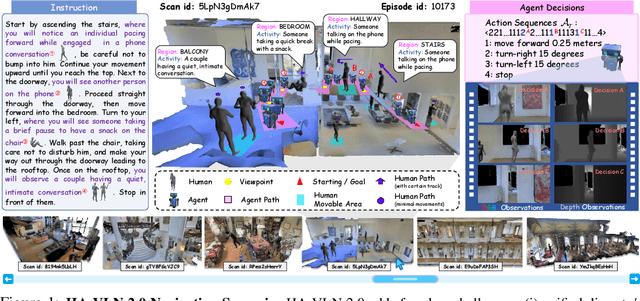
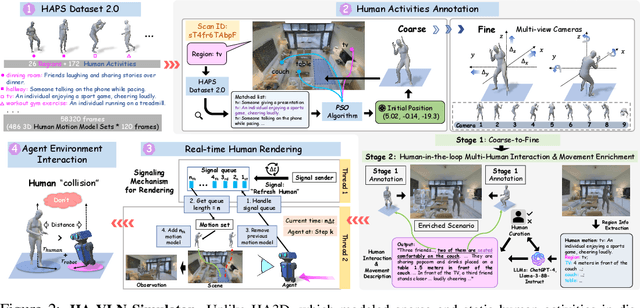
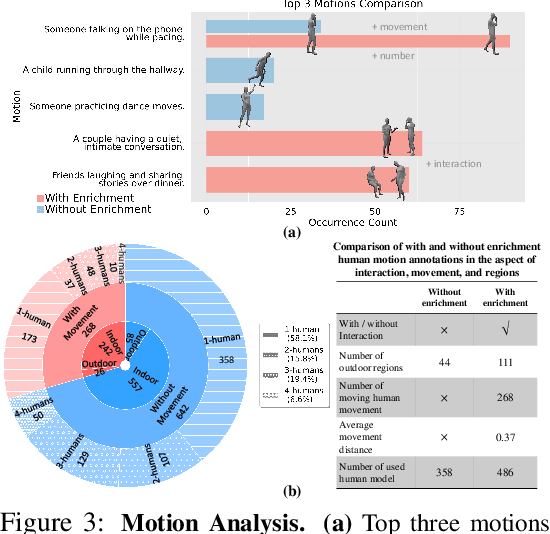

Abstract:Vision-and-Language Navigation (VLN) systems often focus on either discrete (panoramic) or continuous (free-motion) paradigms alone, overlooking the complexities of human-populated, dynamic environments. We introduce a unified Human-Aware VLN (HA-VLN) benchmark that merges these paradigms under explicit social-awareness constraints. Our contributions include: 1. A standardized task definition that balances discrete-continuous navigation with personal-space requirements; 2. An enhanced human motion dataset (HAPS 2.0) and upgraded simulators capturing realistic multi-human interactions, outdoor contexts, and refined motion-language alignment; 3. Extensive benchmarking on 16,844 human-centric instructions, revealing how multi-human dynamics and partial observability pose substantial challenges for leading VLN agents; 4. Real-world robot tests validating sim-to-real transfer in crowded indoor spaces; and 5. A public leaderboard supporting transparent comparisons across discrete and continuous tasks. Empirical results show improved navigation success and fewer collisions when social context is integrated, underscoring the need for human-centric design. By releasing all datasets, simulators, agent code, and evaluation tools, we aim to advance safer, more capable, and socially responsible VLN research.
Neural Spatial-Temporal Tensor Representation for Infrared Small Target Detection
Dec 23, 2024Abstract:Optimization-based approaches dominate infrared small target detection as they leverage infrared imagery's intrinsic low-rankness and sparsity. While effective for single-frame images, they struggle with dynamic changes in multi-frame scenarios as traditional spatial-temporal representations often fail to adapt. To address these challenges, we introduce a Neural-represented Spatial-Temporal Tensor (NeurSTT) model. This framework employs nonlinear networks to enhance spatial-temporal feature correlations in background approximation, thereby supporting target detection in an unsupervised manner. Specifically, we employ neural layers to approximate sequential backgrounds within a low-rank informed deep scheme. A neural three-dimensional total variation is developed to refine background smoothness while reducing static target-like clusters in sequences. Traditional sparsity constraints are incorporated into the loss functions to preserve potential targets. By replacing complex solvers with a deep updating strategy, NeurSTT simplifies the optimization process in a domain-awareness way. Visual and numerical results across various datasets demonstrate that our method outperforms detection challenges. Notably, it has 16.6$\times$ fewer parameters and averaged 19.19\% higher in $IoU$ compared to the suboptimal method on $256 \times 256$ sequences.
RPCANet: Deep Unfolding RPCA Based Infrared Small Target Detection
Nov 02, 2023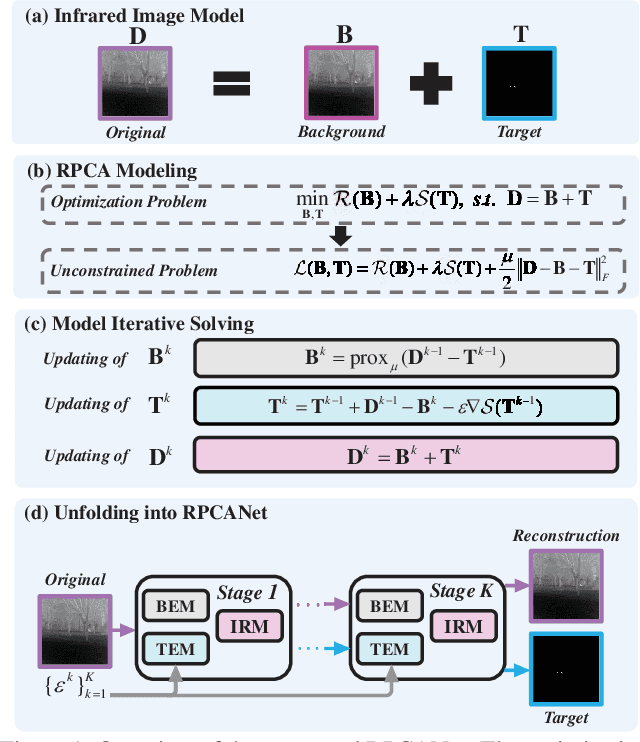
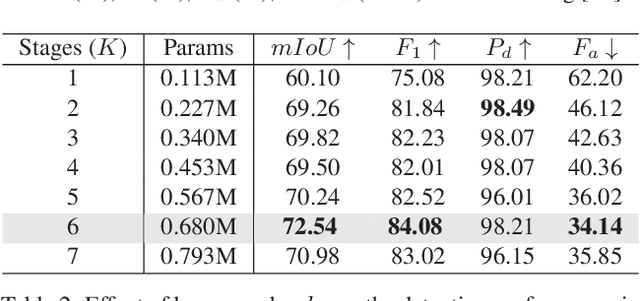

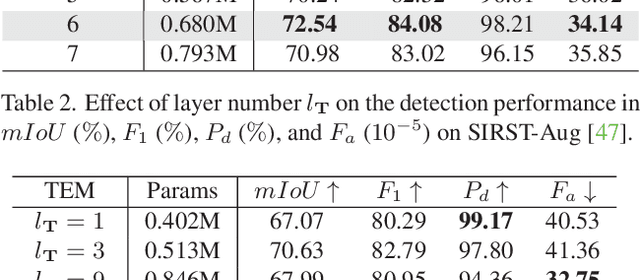
Abstract:Deep learning (DL) networks have achieved remarkable performance in infrared small target detection (ISTD). However, these structures exhibit a deficiency in interpretability and are widely regarded as black boxes, as they disregard domain knowledge in ISTD. To alleviate this issue, this work proposes an interpretable deep network for detecting infrared dim targets, dubbed RPCANet. Specifically, our approach formulates the ISTD task as sparse target extraction, low-rank background estimation, and image reconstruction in a relaxed Robust Principle Component Analysis (RPCA) model. By unfolding the iterative optimization updating steps into a deep-learning framework, time-consuming and complex matrix calculations are replaced by theory-guided neural networks. RPCANet detects targets with clear interpretability and preserves the intrinsic image feature, instead of directly transforming the detection task into a matrix decomposition problem. Extensive experiments substantiate the effectiveness of our deep unfolding framework and demonstrate its trustworthy results, surpassing baseline methods in both qualitative and quantitative evaluations.
 Add to Chrome
Add to Chrome Add to Firefox
Add to Firefox Add to Edge
Add to Edge